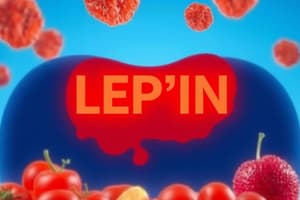Podcast
Questions and Answers
What is the minimum sample size suggested for evaluating a diet program?
What is the minimum sample size suggested for evaluating a diet program?
- 200 participants
- 1000 participants
- 500 participants (correct)
- 300 participants
Which element is essential in designing a treatment and control group for a diet program?
Which element is essential in designing a treatment and control group for a diet program?
- Different levels of hunger
- Identical motivation levels (correct)
- Altered schedules for meals
- Varied dietary preferences
What percentage of initial body weight loss is typically defined as successful after one year on a diet program?
What percentage of initial body weight loss is typically defined as successful after one year on a diet program?
- 15%
- 10%
- 5% (correct)
- 20%
In the three studies mentioned, how many months were participants evaluated in total?
In the three studies mentioned, how many months were participants evaluated in total?
What defines a low-fat diet according to the provided information?
What defines a low-fat diet according to the provided information?
What is a likely reason for the success of dieting among overweight children?
What is a likely reason for the success of dieting among overweight children?
What is emphasized in treating overweight and obesity, according to the content?
What is emphasized in treating overweight and obesity, according to the content?
What should be prioritized in health promotion strategies for weight management?
What should be prioritized in health promotion strategies for weight management?
How many guidelines have focused on environmental changes regarding healthy weight in the US?
How many guidelines have focused on environmental changes regarding healthy weight in the US?
What percentage of Australians are reported to take too little or no exercise?
What percentage of Australians are reported to take too little or no exercise?
Which approach is suggested for ridding childhood obesity issues?
Which approach is suggested for ridding childhood obesity issues?
In what manner should fitness be integrated into education to combat obesity?
In what manner should fitness be integrated into education to combat obesity?
What impact can the environment have on childhood obesity?
What impact can the environment have on childhood obesity?
What is a notable challenge in evaluating the effectiveness of the Mediterranean diet?
What is a notable challenge in evaluating the effectiveness of the Mediterranean diet?
What was the main dietary composition difference between the low-protein and high-protein diets in the study mentioned?
What was the main dietary composition difference between the low-protein and high-protein diets in the study mentioned?
Which diet is highlighted for potentially being similar in benefits to the Mediterranean diet?
Which diet is highlighted for potentially being similar in benefits to the Mediterranean diet?
What does the evidence suggest about high protein diets compared to low protein diets regarding weight loss?
What does the evidence suggest about high protein diets compared to low protein diets regarding weight loss?
Why is the Paleo diet's premise considered dubious?
Why is the Paleo diet's premise considered dubious?
What is a characteristic of the randomized control trial mentioned in the content?
What is a characteristic of the randomized control trial mentioned in the content?
What is a commonly cited misconception about high-protein diets?
What is a commonly cited misconception about high-protein diets?
How does weight loss in the mid-section compare between high-protein and low-protein diets according to the study?
How does weight loss in the mid-section compare between high-protein and low-protein diets according to the study?
Flashcards
Diet program evaluation
Diet program evaluation
Evaluating a diet program requires a large sample size (500+), treatment and control groups, and random allocation. Success is typically a 5% weight loss over a year.
Control group
Control group
In a diet study, the control group does not receive the treatment (diet). Crucially, the control group should experience similar contact, information and motivation as the treatment group.
Low-fat diet (definition)
Low-fat diet (definition)
A diet program that gets 20% of its energy from fat – usually a target of 1500 calories a day with around 30g of fat.
Weight loss success definition
Weight loss success definition
Signup and view all the flashcards
Trial sample size
Trial sample size
Signup and view all the flashcards
Dieting success in children
Dieting success in children
Signup and view all the flashcards
Realistic weight loss approach
Realistic weight loss approach
Signup and view all the flashcards
Environmental factors (diet)
Environmental factors (diet)
Signup and view all the flashcards
Lack of environmental focus
Lack of environmental focus
Signup and view all the flashcards
Importance of physical activity
Importance of physical activity
Signup and view all the flashcards
Built environment for health
Built environment for health
Signup and view all the flashcards
Commercialization of junk food
Commercialization of junk food
Signup and view all the flashcards
Children's health promotion
Children's health promotion
Signup and view all the flashcards
Mediterranean Diet Effect on Weight
Mediterranean Diet Effect on Weight
Signup and view all the flashcards
Med Diet Health Benefits (Other)
Med Diet Health Benefits (Other)
Signup and view all the flashcards
High Protein Diets (e.g., Zone, Paleo)
High Protein Diets (e.g., Zone, Paleo)
Signup and view all the flashcards
Paleo Diet's Assumptions
Paleo Diet's Assumptions
Signup and view all the flashcards
High Protein Diet Study Design
High Protein Diet Study Design
Signup and view all the flashcards
Weight Loss Difference (High Protein)
Weight Loss Difference (High Protein)
Signup and view all the flashcards
Diet Study Compliance
Diet Study Compliance
Signup and view all the flashcards
High Protein Diet Limitations
High Protein Diet Limitations
Signup and view all the flashcards
Study Notes
Obesity III - Appetite and Psychology of Eating and Drinking
- Obesity is caused by energy intake exceeding energy expenditure
- The best approach is to prevent obesity in the first place
- This lecture and the next will cover treatment options for overweight/obesity
- These approaches are often combined
- Prevention will also be briefly covered today
Treatment Options
- Diet is a key strategy, with many options available (over 1200 diet books)
- Exercise guidelines and effectiveness are explored
- Behavior therapy assists in change and relapse prevention
- Drugs (limited choices currently available)
- Surgery is highly effective
Recommendations
- The National Heart, Lung, and Blood Institute (US) provides evidence-based guidelines for treatment selection
- These guidelines consider BMI categories (25-26.9, 27-29.9, 30-34.9, 35-35.9, >40)
- Treatment options based on BMI and comorbidities are suggested (diet, exercise, behavior therapy, drugs, surgery)
Diet - Introduction
- Obesity results from consuming more energy than using
- Diets vary from evidence-based to those with no scientific basis -(e.g., detox or magic ingredient/device diets)
- All effective diets reduce energy consumption leading to negative energy balance, promoting fat burning and weight loss.
Diet - Basics I
- Diet strategies are mainly focused on macronutrient content (fat, protein, carbohydrate)
- Glycemic index, portion size, chewing rate, energy density (low-fiber, high-water content), and fasting are potential dietary modifications
Diet - Basics II
- Gold standard diets like low-fat, emphasizing high protein, emphasizing low carbs, low glycemic index, the Mediterranean diet are examined
- Efficacy and health impacts of these diets are often studied.
Fat Reduction Diets
- Fat is the most energy-dense macronutrient.
- Reducing fat consumption is effective for weight loss.
- Traditional low-fat diets remain a common medical intervention.
How to Evaluate a Diet
- A successful diet program involves large sample sizes (500+), treatment and control groups, random allocation, and a 5% weight loss target at 1 year as a measure of success.
Do Diets Work?
- Three large clinical trials (6 and 12-month follow-up) evaluated different diets.
- Findings from studies of Weight Watchers and Jenny Craig demonstrate effectiveness (5-6% weight loss).
Very Low Fat Diets
- Very low fat strategies, with an intake less than 5% fat and 1000-1200 calories/day, lead to substantial initial weight loss, but weight can return over time
- These are often used as pre-surgical weight reduction interventions
Mediterranean (Med) Diet
- This diet is a good example of a balanced approach considering good fats, high fiber, and complex carbohydrates leading to health benefits and lifespan, and lower risks of disease like heart disease
High Protein Diets
- These diets are based on increasing protein rather than reducing carbs or fat
- High protein diets may lead to greater weight-loss initially compared to no-protein diets but the effect is comparable to low-fat diets
Low Carbohydrate Diets
- These diets emphasize reduction in carbohydrate intake, as opposed to reducing fat or protein.
- Several studies examined the effectiveness using a meta-analysis.
- Atkins diet was studied in these diets
Diets - General Considerations
- Factors influencing successful weight loss include diet duration, maintenance, and individual factors (e.g., psychological, societal).
- Long-term treatment duration is a strong predictor of successful weight loss.
- A longer course of treatment likely leads to greater loss and more sustainable maintenance.
What Predicts Weight Loss Success?
- Length of formal treatment phase is the primary predictor of success
- Longer treatment leads to better outcomes.
Maintenance
- Long-term weight loss is typically modest.
- Interventions like (group therapy or telephone follow-up) don't consistently demonstrate a greater benefit over time.
What Helps Maintenance?
- Treatment length and multi-component interventions help with maintenance.
- Motivational enhancements and reinforcement are also effective.
What Makes for a Successful Dieter?
- National Weight Control Registry (overweight people who have lost significant amounts of weight) highlight: extended treatment and low daily calorie intake are key to success
- Factors associated with success in dieting include regular exercise, being vigilant in monitoring weight.
Promoting Healthy Diets
- Obesity is often an environmental issue more than individual behaviors
- It is challenging to make significant weight loss changes.
Health Promotion and Diet I and II
- Environmental factors play a large role impacting individuals and their dietary choices.
- Commercialization of childhood (marketing, access) plays a key role
- Strategies for promotion include raising awareness, decreasing the affordability of unhealthy food and providing greater access to nutritional food and greater opportunity for physical activity
Diet in Children
- Significant (10-15% loss) weight loss is possible for children in the 10-year period after adopting specific dietary programs.
- Parental support often plays a crucial role in the success of strategies.
Studying That Suits You
Use AI to generate personalized quizzes and flashcards to suit your learning preferences.




